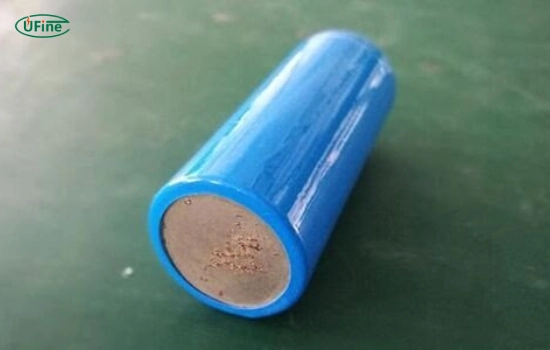
- Part 1. What is battery rust?
- Part 2. Do lithium batteries rust?
- Part 3. The chemistry behind rust resistance
- Part 4. How lithium battery design prevents rust?
- Part 5. Comparing with lead-acid and alkaline batteries
- Part 6. Real-world scenarios: Why rust matters
- Part 7. What happens if lithium batteries get wet?
- Part 8. External metal parts and corrosion
- Part 9. Role of the Battery Management System (BMS)
- Part 10. How to prevent any kind of corrosion?
- Part 11. FAQs about lithium battery rust
Lithium batteries don’t rust because their internal chemistry doesn’t involve iron, and their design includes anti-moisture protections. This makes them highly resistant to corrosion, unlike traditional batteries that often suffer from battery rust over time.
In this article, we’ll break down the science behind lithium battery rust resistance, compare them with other battery types like lead-acid and alkaline models, and explain how their construction helps prevent rusting. If you’ve ever wondered “Do lithium batteries rust?”, this guide will give you a clear, detailed, and easy-to-understand answer.
Part 1. What is battery rust?
Battery rust is a form of corrosion that occurs when metals inside or outside a battery react with moisture or oxygen. This reaction often leads to a reddish or brownish buildup, especially around battery terminals or casings. Rust can degrade battery performance, cause leakage, or even lead to complete failure.
But not all batteries are prone to rust in the same way. The type of metal used and how the battery is sealed play a major role in whether rust forms.
Part 2. Do lithium batteries rust?
No, lithium batteries do not rust in the traditional sense. That’s because they don’t use iron or other rust-prone metals in their internal chemistry. Instead, lithium-ion cells rely on materials like lithium cobalt oxide, graphite, and aluminum—none of which rust like iron does.
This is the key reason why lithium battery rust is not a common issue. The absence of iron in their core structure means there’s no material inside the cell to oxidize and form rust.
Part 3. The chemistry behind rust resistance
Let’s look at battery rust chemistry in more detail.
Rust is the result of oxidation, a chemical reaction between iron, oxygen, and water. This reaction forms iron oxide, commonly known as rust.
In lead-acid and alkaline batteries, metal parts like steel casings or iron components can react with moisture. Over time, this leads to rust and corrosion.
In contrast, lithium batteries use:
- Aluminum for the cathode current collector
- Copper for the anode current collector
- Graphite as the anode material
- Lithium metal oxides as cathode materials
None of these materials rust in the traditional way because they lack iron. Though they can corrode under extreme conditions, they do not form rust.
Part 4. How lithium battery design prevents rust?
Beyond chemistry, the physical design of lithium batteries also helps prevent rust.
Modern lithium batteries are built with:
- Sealed enclosures to keep out air and moisture
- Battery Management Systems (BMS) that monitor and control conditions
- Corrosion-resistant outer casings, often made from aluminum or stainless steel
- Moisture barriers in the form of gaskets and adhesives
These layers of protection mean that even if the battery is exposed to a humid environment, moisture won’t reach critical components.
Part 5. Comparing with lead-acid and alkaline batteries
Let’s compare lithium batteries with other common types.
Lead-acid batteries:
- Use lead plates submerged in sulfuric acid
- Often have steel terminals that can rust
- Vent gases during charging, which promotes corrosion
- Are prone to acid leaks, which accelerate rust
Alkaline batteries:
- Contain zinc and manganese dioxide
- Have metal casings that can corrode in humid conditions
- Are often single-use and not tightly sealed
Both types are more vulnerable to rust than lithium batteries because of their materials and less advanced sealing techniques.
Part 6. Real-world scenarios: Why rust matters
Battery rust can lead to serious problems:
- Reduced power output
- Short circuits
- Battery swelling or leakage
- Device damage
In devices like RVs, solar systems, or electric vehicles, a rust-free power source is crucial. That’s why lithium batteries are often chosen—they last longer and are more reliable in tough environments.
Part 7. What happens if lithium batteries get wet?
Here’s a smart question: What if a lithium battery gets wet?
If the battery casing is intact and the BMS is functioning, nothing happens. The water doesn’t reach the internal components. However, if the seal is broken, water can enter and cause a short circuit, not rust.
This is another reason why the design of the casing and sealing is so important. A well-sealed lithium battery can handle humidity and even brief exposure to water, which is critical in outdoor and mobile applications.
Part 8. External metal parts and corrosion
While the internal parts of a lithium battery don’t rust, what about the external parts?
Some batteries may have steel terminals or mounting brackets. These can rust if exposed to moisture. However, most high-quality lithium battery manufacturers use nickel-plated or stainless steel terminals to prevent this.
Also, many battery banks come with protective coatings or plastic enclosures to eliminate exposure to air or water.
Part 9. Role of the Battery Management System (BMS)
The Battery Management System (BMS) is a key feature in modern lithium batteries that helps prevent conditions that lead to corrosion.
It monitors:
- Temperature
- Voltage
- Humidity
- Charge/discharge cycles
If conditions become unsafe, the BMS can shut down the battery or reduce the load, protecting internal components from damage.
This intelligent system is one of the reasons lithium batteries are so much more durable than older technologies.
Part 10. How to prevent any kind of corrosion?
Even though lithium batteries are rust-resistant, here are simple steps to protect any battery from corrosion:
- Keep batteries dry
- Store at room temperature
- Use moisture-proof enclosures
- Regularly inspect terminals
- Apply dielectric grease to external contacts if needed
These tips add an extra layer of protection, especially in marine or off-grid environments.
Part 11. FAQs about lithium battery rust
Do lithium batteries rust like lead-acid batteries?
No. Lithium batteries do not contain iron, which is required for rust to form. Their design and materials make them resistant to battery rust.
Can the outside of a lithium battery rust?
Only if it’s made with steel parts and exposed to moisture. However, most lithium batteries use aluminum or stainless steel, which are corrosion-resistant.
Is battery rust dangerous?
Yes. Rust can interfere with electrical conductivity, cause short circuits, or lead to leakage. It is especially problematic in high-drain applications.
Why are lithium batteries better for wet environments?
Their sealed design, non-rusting components, and internal BMS make them ideal for humid or marine settings.
How do I know if a battery is rusting?
Look for reddish-brown buildup around terminals, corrosion on the casing, or performance drops. Lithium batteries rarely show these signs.
Related Tags:
More Articles

고방전 배터리는 높은 전류와 발열로 배터리수명이 줄어듭니다. 구조적 한계, 사용 패턴, 충전 습관 등 실제 수명 단축 요인을 체계적으로 분석했습니다.
Capacitor vs Battery: What is the Difference?
Capacitor vs battery explained in detail. Learn the difference between capacitor and battery in energy storage, charging speed, lifespan, and real applications.
18650 Battery vs AA: Which Is Better for Your Device?
Compare 18650 vs AA batteries in capacity, voltage, rechargeability, and applications. Learn which battery type fits high-drain or everyday devices.
What is the Difference Between Battery Cell, Battery Control Module, and Battery Pack?
Compare battery cells, modules, and packs. Learn functions, design differences, control modules, and selection tips for EV, ESS, and industrial use.
How to Prevent LiPo Battery Explosion?
Can LiPo batteries explode or catch fire? Learn key causes of LiPo battery fires and proven charging, storage, and handling tips to reduce explosion risk.



